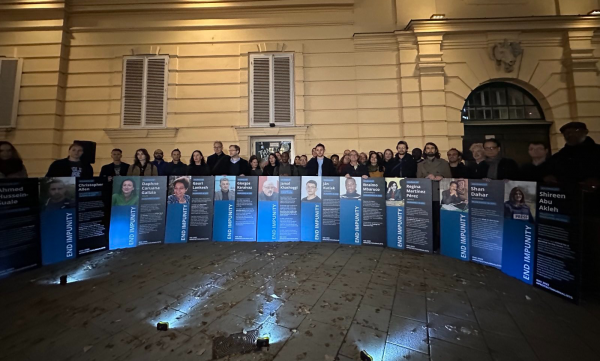IPI welcomes the release of Turkish journalists Adem Özköse and Hamit Coşkun, who spent over two months in Syrian custody before being transferred to Tehran and finally to Istanbul, according to news reports. Iran reportedly served as an intermediary in their release.
Reporter Özköse and cameraman Coşkun were detained at a roadblock by pro-government militiamen and eventually transferred to a prison in Damascus, the Al Jazeera website reported the journalists as saying.
The pair were in Syria in order to film a documentary and report on developments there, reports said. Özköse is also a correspondent for Gercek Hayat (Real Life) magazine.
Özköse said that they “lived for 11 days in the shadow of death” while in hands of the militiamen, who threatened them with pistols, according to AFP. They were later transferred to a Damascene prison where they spent 55 days sleeping on the floor, AFP reported. Özköse told AFP there had been “all kinds of trading – they wanted to exchange us for all sorts of things. It’s because of the negotiations, these meetings that the process took so long.”
“We welcome the release of Adem Özköse and Hamit Coşkun, and are delighted that these journalists are home safe,” said IPI Executive Director Alison Bethel McKenzie. “However, we call on the Syrian authorities to release the many other journalists and press freedom advocates who remain in custody and who are believed to be at risk of torture.”
It has been over a year since the uprising in Syria first began, and the United Nations estimates that over 9000 people have been killed. Throughout, foreign media have been prevented from reporting freely, instead relying on images and information about the crackdown, arrests and killings from local activists, which are also difficult to verify. The government, for its part, continues to blame the unrest on “terrorists” and “armed gangs.”
Many of the journalists and media activists who challenged that narrative have been killed [link to IPI DeathWatch] or jailed. Among those who are in prison are Mazen Darwish, the head of the Syrian Centre for Media and Freedom of Expression (SCM), and a number of his colleagues.
On 16 February, Darwish, was arrested along with 15 others who were in the organization’s Damascus headquarters that day. The women among the detainees were released on condition that they report to Air Force Intelligence each morning, while Darwish and his male colleagues have been incommunicado since that time and denied access to their families or legal counsel, according to the SCM.
Five of the women and three of the men appeared in court on April 22, where they were charged under Article 148 of the Military Penal Code for “having an illegal recording with a view to distribute banned publications,” and with “having illegal recordings with a view to incite demonstrations,” the SCM told IPI. Those charged were Yara Bader, Hanadi Zahlout, Razan Ghazzawi, Mayadah Khaleel, Thanaa Zetani, Joan Farso, Ayham Ghazzol and Bassam Al-Alhmad.
There is still no information on the condition of Darwish, Hussein Ghrer, Abd Rahman Al Hamada, Hani Zateni or Mansour Al Omarie, though the SCM and other groups fear that they are at risk of torture.
“If the Syrian government wants to show that it is serious about peace and implementing the six-point peace plan recommended by U.N. Joint Special Envoy Kofi Annan, it should begin by releasing Darwish and others from the SCM as part of its commitment to freeing arbitrarily detained prisoners. Syria should also, as it has agreed, ensure freedom of movement for journalists,” McKenzie said.
***********************************************************
UPDATE/CORRECTION, May 15, 2012 – Yara Bader, Handi Zahlout, Razan Ghazzoui, Sanaa Zitani, Mayada Alkhalil, Joan Ferso, Ayham Ghazzoul, Bassam Alhmad were released from prison on May 11, but will return to court on May 29, according to a statement received Massoud Akko, head of the press freedom committee at the SCM.
Mazen Darwish is expected to be present as a witness, and it will be the first time he has appeared in public since he and his colleagues were arrested in February, the SCM said. Darwish, Ghrer, Al Hamada, Zateni and Al Omarie remain in detention.


